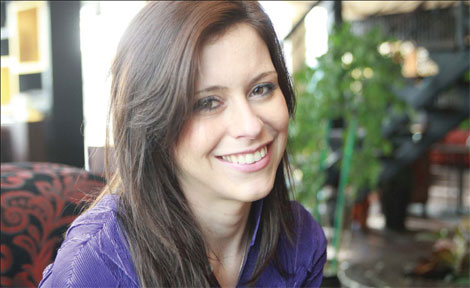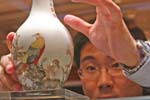Plucking heart strings
Updated: 2011-04-01 10:25
By Eric Zhou (China Daily European Weekly)
Scottish harp player wows Chinese audiences with Celtic charm
Celtic music has gained an unlikely foothold in China through the Irish dancing sensation of Riverdance. Now Scottish harp player-singer, Katie Targett-Adams, is adding to the Celtic mix proving that music transcends cultures and languages. Debuting in China in 2003 during an international folk arts festival in Nanning, Guangxi Zhuang Autonomous Region, Targett-Adams has been building up her fan base in China ever since.
 |
|
Katie Targett-Adams has a created a niche market for herself and is |
Performing for thousands upon thousands of Chinese captivated by her Celtic melodies, Targett-Adams is surprised by how well her music is received.
"My music is received very warmly and it surprised me the first time we played for a Chinese audience. We had no idea that they would enjoy my music so much," the 32-year-old says. "That obviously motivated me to learn more and do more, write more songs and come back.
"It's quite exciting from that point of view because you never know where it will go but I seem to always get a lovely reaction from the crowd."
Targett-Adams believes that one of the reasons why her music is successful in China is the similarities between Celtic folk music and Chinese folk music, both having a similar five note scale.
Despite the similarities, Targett-Adams biggest draw might be the fact that she is a bilingual singer. She sings her songs in both Chinese and English, localizing her music for a Chinese crowd.
"In the beginning when I learned my first song I didn't know the words, it's a very good way to learn the language," she says. "For example, I'll learn the song and know the words, but only when I go to my Chinese teacher and I say, 'listen to me singing' she'll go, 'this word has to be changed' and then you have to sing the tones. It's a whole minefield," Targett-Adams says.
"Actually, that's what made my Putonghua pronounciation better. Because if you don't sing it right and you don't copy it right then people won't rate it."
Originally from Edinburgh, Targett-Adams picked up the Scottish harp or clarsach at the age of 9. Prompted by a local festival, she eventually took up lessons and began playing the clarasch full time.
Going on to study in modern and medieval languages at Oxford, Targett-Adams went on to make her first major international performance from the Scottish Tourism Board, sending her to Washington DC. From that moment on, Targett-Adams' performing career took off.
In 2003, during a performance at Stirling Castle in Scotland, her China connection was made.
Sitting in the crowd during that show was the senior Chinese cultural officier to London. Captivated by her musical skills, Targett-Adams was invited to perform in Nanning, and from there, the Chinese phase of her career began. It prompted her to learn Chinese.
"The first year I came, I just couldn't get over that I couldn't speak to anybody because as a native English speaker you get kind of lazy, even though I studied Spanish and German. I love language," Targett-Adams says.
"But in 2003 and in Nanning you just had to speak Chinese otherwise you were lost so I thought I'd had better start to learn, and it's been five years now, on and off."
Using that mentality, Targett-Adams began experimenting with Chinese music. At first, she would listen to a Chinese song she liked and then sing it. She sang it to teacher to make sure she was getting the tones right. Targett-Adams says this is one method that has really helped her learn Mandarin, though she attests that her language skills still have a long way to go.
Blending forms of language and music, Targett-Adams created a niche for herself in China: a Celtic harp player and songstress who can sing in Chinese.
Traveling to and from Scotland and China, Targett-Adams eventually settled down in Hong Kong and opened a dance school.
"Every year it kept kind of growing a bit," she says.
"I started getting asked by the Scottish government to play in China, by the Scottish tourist board, and then by Scottish companies," Targett-Adams says.
"I was commuting from Edinburgh to China so I might as well move to China and see what happens."
Though Targett-Adams performs a lot on the Chinese mainland and Beijing was her first home base, she eventually was lured to Hong Kong.
In 2008, she opened Ceroc, a dancing school dedicated to teaching freestyle duos dancing.
Even though she never planned to live in the Chinese mainland or Hong Kong, Targett-Adams is happy with how things turned out, and says receives strongly support by her family and friends back in Scotland. She also feels a lot of love from her fans in China.
"I didn't plan all this but it turns out that China is the place to be," she says. "You don't know when you start your life that you'd end up on the other side of the world, but I think everyone in Scotland is very supportive of me being over here in China," Targett-Adams says.
"It's interesting that my events now are all very much Asia focused, whereas I was doing a lot in America and Europe but now it's all over in Asia. Wherever you are is where you build up your name, isn't it?"
E-paper

Green light
F1 sponsors expect lucrative returns from Shanghai pit stop
Preview of the coming issue
Buying into the romance
Born to fly
Specials

Share your China stories!
Foreign readers are invited to share your China stories.

No more Mr. Bad Guy
Italian actor plans to smash ‘foreign devil’ myth and become the first white kungfu star made in China.

Art auctions
China accounted for 33% of global fine art sales.
